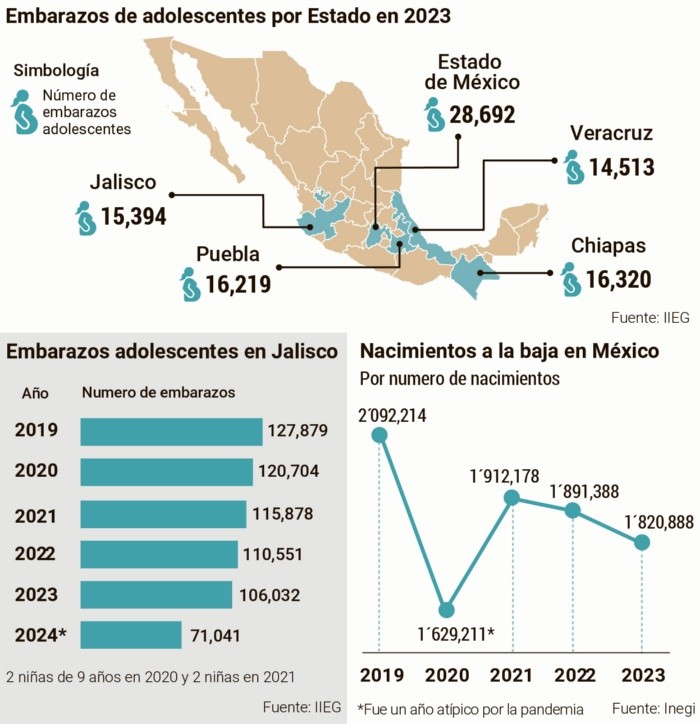Being a mother at 17: a reality that persists in Jalisco

Lorena is 17 years old and is carrying a three-month-old baby in her arms. She got pregnant last year, while in her fourth semester of high school. Having a daughter wasn't in her plans, as she had two semesters left and was planning to start the process to enroll in university. "It was a mistake. I already asked for permission from high school to spend these months with my baby. I plan to return in August... if possible," says Lorena, originally from Tlajomulco, who is one of the more than 15,000 teenagers who get pregnant each year in Jalisco . And 17 is a key age, according to statistics.
The good news is that cases are declining in the state: more than 21,000 were documented in 2019. However, the World Health Organization warns that teenage pregnancy, that is, between the ages of 10 and 19, represents a high risk. Babies are more likely to be born with low birth weight, prematurely, or with serious neonatal complications.
Alfonso Martín de Alba, professor of Gynecology and Obstetrics at the University of Granada, emphasizes that prevention is essential to reducing this problem. "The entire population must be informed. Menstruation marks the beginning of fertility, but it doesn't mean the body is ready to procreate."
These cases can limit growth and cause serious complications in women, such as preeclampsia or kidney failure, which can even lead to maternal death (which occurs during pregnancy or within the following 42 days).
The Jalisco government promotes prevention campaigns, such as Ruta NAME, which brings together various public agencies to raise awareness and comprehensively address teenage pregnancies. Reproductive health training and services are also offered.

Jalisco ranks fourth in the nation in terms of incidence, behind the State of Mexico, Puebla, and Chiapas . At the local level, Zapopan , Tlajomulco , Guadalajara, Tlaquepaque , and Tonalá lead the statistics, respectively.
Eva Elizabeth Camarena, a professor at the University of Granada (UdeG), welcomes the reduction recorded in recent years, but insists on reinforcing sex education starting in primary school. “Sexual life begins at younger ages. In 2023, 400 pregnancies were recorded among girls under 15. There shouldn't be any pregnant girls.”
Maternal deaths are another problem. In 2021, 61 deaths from this cause were recorded in Jalisco . In 2023, the number dropped to 48 across all ages, but it remains a concern, according to experts.
Roberto Carlos Rivera, Director of Public Health for the State, agrees that prevention is essential. He emphasizes that the most serious cases usually occur in women without access to social security and without prenatal care. "Many patients arrive with severe complications due to lack of prior care. Preconception care allows for the detection of deficiencies and the prevention of serious risks."
An alarming fact is that dengue has become a leading cause of maternal death in Jalisco. Dr. Eva Elizabeth Camarena adds that some patients die from complications resulting from the virus during pregnancy, highlighting the urgency of strengthening infectious disease prevention in this vulnerable group.
informador





